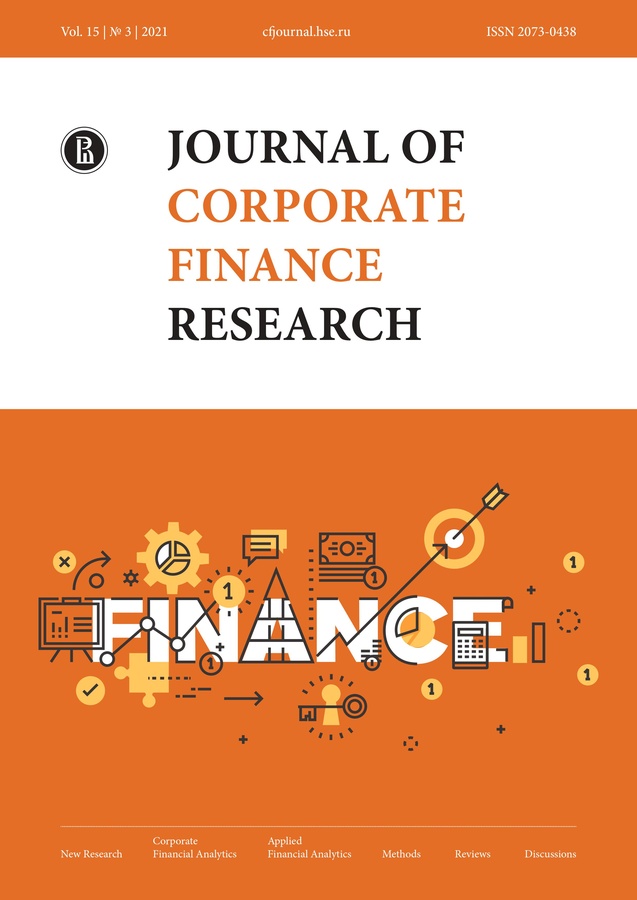Can the Fraud Triangle Detect Financial Statement Fraud? (An Empirical Study of Manufacturing Companies in Indonesia)
- Авторы: Herdjiono I.1, Kabalmay B.N1
-
Учреждения:
- Musamus university
- Выпуск: Том 15, № 3 (2021)
- Страницы: 28-38
- Раздел: Новые исследования
- URL: https://bakhtiniada.ru/2073-0438/article/view/303415
- DOI: https://doi.org/10.17323/j.jcfr.2073-0438.15.3.2021.28-38
- ID: 303415
Цитировать
Полный текст
Аннотация
This study examines the effect of the following factors on financial statement fraud: (1) external pressure, (2) personal financial need, (3) financial targets, (4) the nature of industry, (5) ineffective monitoring, and (6) rationalization. The population in this study consisted of companies listed on the Indonesia Stock Exchange (IDX) over the period 2016-2018. The analysis was conducted with the help of the logistic regression method.
The results of this study indicate that external pressure, financial targets and the nature of industry have an effect on financial statement fraud, while personal financial need, ineffective monitoring and rationalization have no effect on financial statement fraud. Thus, this study contributes to the understanding that not all aspects of the fraud triangle can detect fraud.
Ключевые слова
Об авторах
I. Herdjiono
Musamus university
Автор, ответственный за переписку.
Email: herdjiono@unmus.ac.id
B. N Kabalmay
Email: kabalmaybn@gmail.com
Список литературы
- Survai fraud Indonesia 2016. Jakarta: ACFE Indonesian Chapter; 2017. 66 p. URL: https://acfe-indonesia.or.id/wp-content/uploads/2017/07/SURVAI-FRAUD-INDONESIA-2016_Final.pdf (accessed on 04.03.2020).
- Report to the nations. 2018 Global study on occupational fraud and abuse: Asia-Pacific edition. Austin, TX: Association of Certified Fraud Examiners; 2018. 22 p. URL: https://www.acfe.com/uploadedFiles/ACFE_Website/Content/rttn/2018/RTTN-Asia-Pacific-Edition.pdf (accessed on 17.03.2020).
- Chen Y., Zhu S., Wang Y. Corporate fraud and bank loans: Evidence from China. China Journal of Accounting Research. 2011;4(3):155–165. https://doi.org/10.1016/j.cjar.2011.07.001
- Tiffani L., Marfuah M. Deteksi Financial Statement Fraud Dengan Analisis Fraud Triangle Pada Perusahaan Manufaktur Yang Terdaftar di Bursa Efek Indonesia. Jurnal Akuntansi dan Auditing Indonesia. 2015;19(2):112–125. https://doi.org/10.20885/jaai.vol19.iss2.art3
- Parlindungan R., Africano F., Elizabeth P. Financial statement fraud detection using published data based on fraud triangle theory. Journal of Computational and Theoretical Nanoscience. 2017;23(8):7054–7058. https://doi.org/10.1166/asl.2017.9288
- Fitri F.A., Syukur M., Justisa G. Do the fraud triangle components motivate fraud in Indonesia? Australasian Accounting, Business and Finance Journal. 2019;13(4):63–72. https://doi.org/10.14453/aabfj.v13i4.5
- Aghghaleh S.F., Mohamed Z.M. Fraud risk factors of fraud triangle and the likelihood of fraud occurrence: Evidence from Malaysia. Information Management and Business Review. 2014;6(1):1–7.
- Li F. Discussion of analyzing speech to detect financial misreporting. Journal of Accounting Research. 2012;50(2):393–400. https://doi.org/10.1111/j.1475-679X.2012.00451.x
- Hobson J.L., Mayew W.J., Venkatachalam M. Analyzing speech to detect financial misreporting. Journal of Accounting Research. 2012;50(2):349–392. https://doi.org/10.1111/j.1475-679X.2011.00433.x
- Jensen M.C., Meckling W.H. Theory of the firm: Managerial behavior, agency costs and ownership structure. Journal of Financial Economics. 1976;3(4):305–360. https://doi.org/10.1016/0304-405X(76)90026-X
- Eisenhardt K.M. Agency theory: An assessment and review. The Academy of Management Review. 1989;14(1):57–74. https://doi.org/10.2307/258191
- Schuchter A., Levi M. Beyond the fraud triangle: Swiss and Austrian elite fraudsters. Accounting Forum. 2015;39(3):176–187. https://doi.org/10.1016/j.accfor.2014.12.001
- Dechow P.M., Ge W., Larson C.R., Sloan R.G. Predicting material accounting misstatements. Contemporary Accounting Research. 2011;28(1):17–82. https://doi.org/10.1111/j.1911-3846.2010.01041.x
- Skousen C.J., Twedt B.J. Fraud in emerging markets: A cross country analysis. Cross Cultural Management: An International Journal. 2009;16(3):301–316. https://doi.org/10.1108/13527600910977373
- Cressey D.R. Other people’s money: A study in the social psychology of embezzlement. Montclair, NJ: Patterson Smith; 1973. 191 p.
- Consideration of fraud in a financial statement audit. AICPA Statement on Auditing Standard. 2002;(99). URL: https://egrove.olemiss.edu/cgi/viewcontent.cgi?article=1100&context=aicpa_sas
- Maka K., Pazhanirajan S., Mallapur S. Selection of most significant variables to detect fraud in financial statements. Materials Today: Proceedings. 2020. In Press. https://doi.org/10.1016/j.matpr.2020.09.613
- Free C. Looking through the fraud triangle: A review and call for new directions. Meditari Accountancy Research. 2015;23(2):175–196. https://doi.org/10.1108/MEDAR-02-2015-0009
- Romney M.B., Steinbart P.J. Accounting information systems. 12th ed. London: Pearson Education Ltd; 2012. 720 p.
- Murdock H. The three dimensions of fraud: Auditors should understand the needs, opportunities, and justifications that lead individuals to commit fraudulent acts. Internal Auditor. 2008;65(4).
- Chen K.Y., Elder R.J. Fraud risk factors and the likelihood of fraudulent financial reporting: Evidence from Statement on Auditing Standards No. 43 in Taiwan. 2007. URL: https://www.researchgate.net/publication/228945894
- Huang S.Y., Lin C.C., Chiu A.A., Yen D.C. Fraud detection using fraud triangle risk factors. Information Systems Frontiers. 2017;19(6):1343–1356. https://doi.org/10.1007/s10796-016-9647-9
- Summers S.L., Sweeney J.T. Fraudulently misstated financial statements and insider trading: An empirical analysis. The Accounting Review. 1998;73(1):131–146.
- Mariati M., Indriani E. Fraud triangle analysis in detecting fraudulent financial statement using fraud score model. Jurnal Ilmiah Ekonomi Bisnis. 2020;25(1):29–44. https://doi.org/10.35760/eb.2020.v25i1.2240
- Anwar Y. The effect of working capital management on profitability in manufacturing company listed in Indonesia Stock Exchange. The Accounting Journal of Binaniaga. 2018;3(1):1–14. https://doi.org/10.33062/ajb.v3i1.173
- Moses T. Corporate governance and corporate fraud: An examination of interaction effects in Nigeria. Asian Journal of Advanced Research and Reports. 2019;4(1):1–11. https://doi.org/10.9734/ajarr/2019/v4i130098
- Richardson S.A., Sloan R.G., Soliman M.T., Tuna I. Accrual reliability, earning persistence and stock prices. Journal of Accounting and Economics. 2005;39(3):437–485. https://doi.org/10.1016/j.jacceco.2005.04.005
- Salleh S.M., Othman R. Board of director’s attributes as deterrence to corporate fraud. Procedia Economics and Finance. 2016;35:82–91. https://doi.org/10.1016/S2212-5671(16)00012-5
- Cohen J., Krishnamoorthy G., Wright A.M. The corporate governance mosaic and financial reporting quality. Journal of Accounting Literature. 2004;23(1):87–152.
- Widagdo A.K., Suppiah S.D. Determinants of compliance with audit committee rules: Evidence from Indonesia. Corporate Ownership and Control. 2014;12(1):609–624. https://doi.org/10.22495/cocv12i1c7p1
- Trompeter G.M., Carpenter T.D., Jones K.L., Riley R.A. Insights for research and practice: What we learn about fraud from other disciplines. Accounting Horizons. 2014;28(4):769–804. https://doi.org/10.2308/acch-50816
- Pérez-Pérez Y., Camacho Miñano M.-del-M., Segovia-Vargas M.-J. Risk on financial reporting in the context of the new audit report in Spain. Revista de Contabilidad = Spanish Accounting Review. 2021;24(1):48–61. https://doi.org/10.6018/rcsar.363001
Дополнительные файлы











